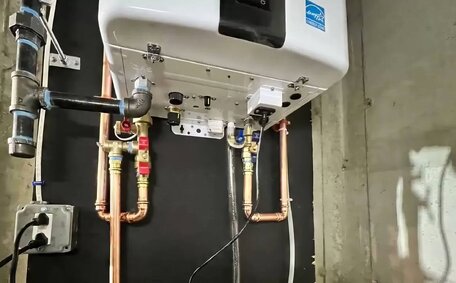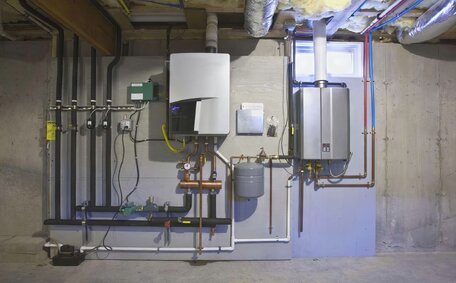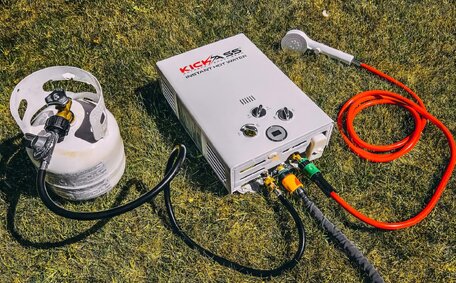Introduction to Direct and Indirect Water Heating
Direct and indirect water heating systems supply hot water to your home through different methods. Direct systems heat water within the appliance, while indirect systems transfer heat using an external source such as a boiler and a heat exchanger.
Essential characteristics of each water heating system type include:
- Direct fired systems heat water faster but may have higher operating costs. Examples are tankless or on-demand water heaters and some storage tank heaters.
- Indirect systems use a heat source like a boiler or furnace, generally with lower running costs than direct fired heaters. In a fired heater system, heat exchangers prevent combustion gases from contacting the water.
- Indirect fired systems frequently feature an expansive hot water tank to cater to hot water demand. This allows for lowering energy consumption, as less energy is needed to maintain warm water, resulting in cost savings.
- Considering the specific type water heater your setup necessitates, installation and overall costs can fluctuate significantly. Site requirements, fuel type, and hot water usage are key factors.
The following sections provide a detailed analysis of the mechanisms of direct and indirect water heaters, evaluating their advantages, efficiency, and suitability for various home scenarios.
How Direct Water Heaters Work
Direct water heaters efficiently heat water internally without an intermediary. They efficiently convert fuel into heat energy directly at the point of use.
Direct fired heaters heat water via burners or heating elements, commonly using an open flame, enabling direct contact with the water. This direct heat transfer method rapidly heats water, providing immediate access to hot water. With direct heating, there’s no need for a heat exchanger or secondary circuit.
Since water is heated on demand, tankless water heaters, typically powered by natural gas, require minimal maintenance and provide immediate hot water without storage. The hot air produced makes them particularly suited for scenarios demanding rapid hot water delivery.
Operating costs for indirect heaters, whether using gas or electricity, might be more than direct systems, subject to local utility prices.
How Indirect Water Heaters Work
Indirect water heaters use an intermediary, like a fluid or a heat exchanger, to transfer heat from an external source such as a boiler or furnace to the water. This protects the water from combustion gases, guaranteeing a clean and safe hot water supply, mitigating some cons of indirect water heaters.
Here is an overview of the operating principles for both direct and indirect water heaters:
- External heat from the furnace, boiler or solar thermal array engages the indirect heating technology and gets transferred to the heat exchanger.
- During indirect heat transfer, stainless steel or copper heat exchangers warm the water tank, eliminating the need for further heating as water circulates.
- Circulated by the boiler, fluids move between the heat exchanger and water tank until the water achieves the desired temperature.
- When you turn on your hot water tap, the system promptly heats water and provides it from the storage tank for immediate use.
The advantages indirect water heating systems can help offer include:
- Doesn’t allow harmful combustion gases like carbon monoxide to contact your water heater supply, resulting in a cleaner supply
- Supplies heated water for versatile applications, including effective space heating cooling through radiators or convectors
- Can merge effortlessly with solar water heating solutions, including heat pump water heaters, for residences with high hot water requirements
- Can operate in tandem with renewable energy sources, such as solar water heater systems and heat pumps
While indirect heaters may be pricier upfront, they offer long-term energy savings and lower standby losses, validating their efficiency. Their expansive tanks likewise guarantee ample hot water for their hot water needs, catering to larger households.
Comparing Energy Efficiency
Energy efficiency is usually higher in direct water heaters than in indirect ones. Direct heaters typically exhibit minimal heat loss while converting fuel to heat at the point of use, enhancing efficiency.
Standard direct water heaters efficiency ranges, as per the U.S. Department of Energy, are:
- Gas direct heaters: up to 98% fuel utilisation efficiency
- Electric direct heaters: 95-99% efficiency
After factoring in piping and tank losses, overall system efficiency may decrease, highlighting opportunities for optimisation.
Indirect heating, while not always as efficient as direct-fired options, can achieve impressive efficiency with proper maintenance and setup. Factors like lower water temperatures, larger tanks, and proper insulation are all key to maintaining optimal heat output and minimising standby losses. Paired with a high-efficiency boiler, your indirect heater can still offer energy savings.
However, systems in large dwellings with substantial daily hot water requirements may derive greater advantage from indirect hot water systems due to energy utilisation and recuperation timing.
Maintenance Requirements
Direct water heaters, with their simple and durable designs, are ideal for homes with uncomplicated hot water requirements and require little upkeep.
Annual flushing of the heat exchanger in indirect water heaters removes mineral build-up, and pairing with a water softener can reduce the need for maintenance. Replacing the anodes in a direct storage tank model every 2-5 years can protect your water heater from impurities.
Annual professional inspection and tune-up of these appliances are crucial for maintaining optimal efficiency and performance.
Maintenance for indirect water heaters should include:
- Inspecting the heat exchanger coils
- Verifying and modulating water temperature and pressure calibrations, akin to the precision required for rotary drums
- Testing control valves and replacing if needed
- Cleaning intake filters if present
- Eliminating bulk solid sedimentation to prevent accumulation
Taking care of routine boiler and water heater tasks can significantly extend their working life.
Installation Costs
Installation costs for direct and indirect water heating systems can significantly differ. Key factors that influence price include:
- Location - Labour and permit expenses may vary by region
- System size - Larger units or tanks cost more
- Fuel type - Units fuelled by electricity frequently emerge as more cost-effective than those dependent on gas oil
- Venting needs - Indirect heaters may require venting infrastructure
- Site complexity - Difficult access or mods raise labour time
Regarding costs, HomeAdvisor provides average prices for several common types:
- Gas tankless/on-demand: $2,000-$4,000 installed
- Electric tankless unit: $400-$1,400 installed
- Conventional storage tank: $500-$1,500 installed
- Indirect oil or gas boiler: $4,000-$8,000 installed
For example, areas with hard water may benefit more from an indirect or solar pre-heat system to reduce scale buildup. Families can invest in their very own gas indirect or tankless model should they encounter insufficient electrical capacity.
To determine the best option for your budget, have a professional assess your site, usage patterns and fuel options. This will provide an accurate quote for purchasing and installing your preferred system.
Applications for Each System
Direct water heaters work well for:
- Small households with 1-2 people, where a tankless water heater can efficiently meet the lower intermittent usage.
- Temperate climates without extreme cold weather demands.
- Condo, apartment, or tiny house applications where enclosed spaces are very limited.
- Households that use mostly electricity. No combustion minimises venting needs.
Indirect systems are preferable when:
- There is high daily demand for hot water to supply multiple bathrooms, appliances, etc.
- You want the option to use renewable energy sources like solar thermal.
- Your location experiences very cold winters so you need ample hot water capacity.
- You have an older home in Croydon Park that lacks sufficient electrical load for a large direct heater.
The number of occupants, climate, hot water usage, and specific site conditions will guide the decision on the most suitable system for a household.
Making the Right Choice for Your Home
When selecting a direct or indirect water heating system in the Croydon Park area, consider your household’s unique needs and constraints:
- Household size - Direct heaters work well for 1-2 people, while indirect systems are better for larger families
- Climate and weather - Extreme winters may dictate a larger indirect water heater
- Usage patterns - Frequent demand favours an indirect system; intermittent draws point to direct
- Space limitations - Direct systems have a smaller footprint for tight spaces
- Fuel source - Electric direct units eliminate combustion exhaust needs
- Water quality - Hard water regions typically couple indirect heaters with water softeners, to alleviate the toll on your boiler
- Existing infrastructure - Older homes may require electrical upgrades for newer systems
The qualified plumbers at Croydon Park Plumbing offer free consultations to assess your indirect water setup for indirectfired heaters, discuss heating requirements, and provide recommendations on the ideal water heating solution to meet your needs and budget.
To schedule a no-obligation quote for direct or indirect water heater replacement, repair and installation services, call us at 1300 349 338 or email jobs@croydonparkplumbingservices.com.au.
Contact Us to Discuss Your System
We hope this overview has helped clarify which type of water heating system might be optimal for providing domestic hot water in your Croydon Park home.
The Croydon Park Plumbing team brings over a decade of experience in installing, repairing, and maintaining various direct and indirect water heaters.
To discuss your specific needs and get expert advice on the right system for your household, contact us today:
We offer free consultations to assess your current setup, usage patterns, space constraints and more. We’ll provide straightforward recommendations so you can make an informed choice.
As your local Sydney plumbers, we pride ourselves on transparent, upfront pricing with no surprises. Get in touch to learn more about cost-effective direct and indirect hot water system solutions for your home.






